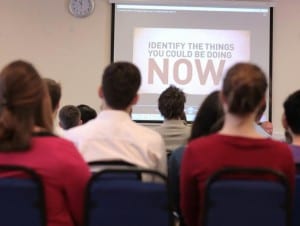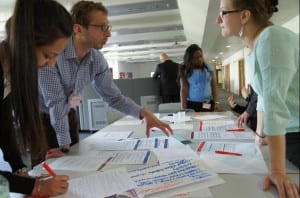Ahead of UCL Careers Media week, Grace, UCL Geography Graduate, gives us her insider’s view on what a Programmatic Account Manager does.
After studying a Ba Geography degree at UCL for 3 years and finishing with a 2.1. I had no set idea what career I wanted to pursue. After toying with a few career paths I was informed by a recruiter that my life was destined for digital marketing. My recruiter promised I had the ideal transferrable skills; good balance of numeracy and writing, some experience in the online world (marketing an event on social media and getting involved in a blog) and an eagerness and confidence to learn and get stuck in.
I was intrigued by this suggestion but also slightly hesitant because I didn’t know what this industry was all about. One of the first roles I was put forward for was for a ‘Programmatic Account Manager’ position with a small but growing company called Periscopix and since then I have not looked back! One of the most exciting aspects of my job is that no day is the same, however here is snippet of my working life here at Periscopix!
First things first:
In a nutshell my role is to purchase online advertising space on behalf of my clients. I buy this ad space using DoubleClick, a bid managing platform owned by Google. I select inventory that will be relevant for my client and only enter an auction if the ad space fits the criteria I’ve chosen. This auction then takes place programmatically, i.e. as a page loads DoubleClick will work out who has selected this particular criteria and who has the highest bid and that person will serve the ad. So you’ve got the gist.. how does my working day pan out?
Quick Check:
Programmatic display is still a baby in the online arena. This fledgling industry is thriving YoY and it’s exciting to be catching the wave of such a ground-breaking practice. As with such young systems it is constantly developing, although this is all in the name of improvement, it is difficult to always stay on top of new features, settings and changes. Thus every morning we will spend 15 minutes looking into our clients’ accounts to check everything seems in order, examining performance and making bid adjustments where necessary.
New client – handover:
Then it’s straight to a meeting room for a sales handover. Eeeek very exciting! A member of the sales team confirms a fitness clothes retailer wants to launch programmatic buying with us. In this internal meeting we discuss what their goals are, what they know about programmatic buying and what they expect to get out of it. It seems relatively standard, they know a little about online display advertising, they are keen to gain brand awareness and quality traffic to their site. Meeting over and it’s straight to the desk to begin thinking about what targeting will be the most relevant and responsive to launch with.
Within around 3 months of working at Periscopix I began being solely responsible for a client from handover. This means I am in control of every aspect of an account. I am in charge of designing the campaign, building the account, ad trafficking, reviewing the set-up, optimising the account on an ongoing basis and, of course, managing all client contact.
This autonomy is unusual for a digital marketing company, but having ownership of an account means I have so much vested interest in the performance, I know the client and the account inside out and I have fantastic variety in my day-to-day working life.
Ad trafficking:
A couple hours of this day I am spending ad trafficking. This is necessary every once in a while with new clients and also existing clients wanting to change theirs up. Today is because a travel agency client has decided to carry out some rebranding. With the industry-wide developments mentioned earlier, the set-up process of uploading ads is always changing. This means there is always a new system to crack and new ad requirements to get to grips with and this process can be a challenge. With internal support from within the team and Bid Manager Support readily available when the job is done it is always a rewarding feeling finally seeing the shiny new ads uploaded into the interface we use. J Especially as they get slicker by the month!
Lunchtime!
The size of Periscopix is growing really fast and the average age of an employer is 27. With an open plan office and new starters every month it is really fun to just sit in the kitchen and meet new people. I was surprised at how quickly I made really good friends here. Often we will take a stroll to borough market or saunter to Potter’s field, a walk is often needed after the free posh coffee, toast and the array of fruits we stock up on in the mornings!
Client meeting:
After lunch I have a meeting with a B2B client that sells mobile analytics. The meeting is taking place at the client’s offices in central London. I am looking forward to the catch up as I have great relationships’ with all my clients, something that is nurtured since handover. It is easy to get on with clients whilst working at Periscopix because our USP is our transparency and commitment. We only have a handful of clients each to ensure we are able to commit time to working on the accounts. Plus we are sharers; we want the client to know what we are doing, why and how we are doing it and what we are planning.
Optimisation:
Aaaah it’s nearing the end of a busy day and I get to optimise! This is the back bone of our job, pouring ourselves into our accounts to tease out trends and work out where to go from here to progress the accounts even further. We have a dozen optimisation tasks we can tackle to improve accounts. My favourite part of my role is finding the gems during optimisation sessions; sites that outperform others, user lists that are responding really well and discovering fascinating insights using lookalike modelling to provide clients with useful insights into who their target online market really is. We foster a test and learn ethos here at Periscopix and so as long as your tests are based on data, anything is acceptable. This freedom and encouragement means although you have in mind what your clients expect, you also get to explore and test what you find interesting.
Home time!
As always the day went too quickly! However its 17:31 and I am out of the door. The directors, Simon and Marc, believe efficiency and productivity stems from a happy workforce and Simon says ‘there is nothing worse than watching the clock and having a boring job’. Hence the company are forever trying to strike a balance of being busy but getting it all done in the working hours – which is a refreshing change from the nightmare graduate schemes I hear about from my friends. Now it’s time for a quick gym session (read: sauna) – membership subsidised by the company of course!
To find out more about UCL Careers Media Week, visit: www.ucl.ac.uk/careers/getinto

 Close
Close




